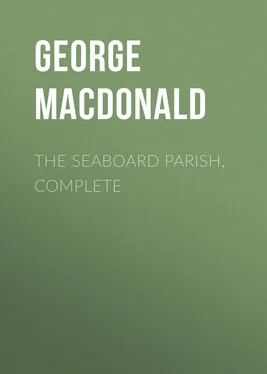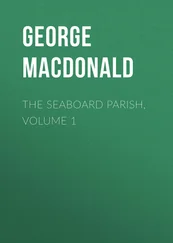George MacDonald - The Seaboard Parish, Complete
Здесь есть возможность читать онлайн «George MacDonald - The Seaboard Parish, Complete» — ознакомительный отрывок электронной книги совершенно бесплатно, а после прочтения отрывка купить полную версию. В некоторых случаях можно слушать аудио, скачать через торрент в формате fb2 и присутствует краткое содержание. Жанр: foreign_prose, literature_19, foreign_antique, на английском языке. Описание произведения, (предисловие) а так же отзывы посетителей доступны на портале библиотеки ЛибКат.
- Название:The Seaboard Parish, Complete
- Автор:
- Жанр:
- Год:неизвестен
- ISBN:нет данных
- Рейтинг книги:3 / 5. Голосов: 1
-
Избранное:Добавить в избранное
- Отзывы:
-
Ваша оценка:
- 60
- 1
- 2
- 3
- 4
- 5
The Seaboard Parish, Complete: краткое содержание, описание и аннотация
Предлагаем к чтению аннотацию, описание, краткое содержание или предисловие (зависит от того, что написал сам автор книги «The Seaboard Parish, Complete»). Если вы не нашли необходимую информацию о книге — напишите в комментариях, мы постараемся отыскать её.
The Seaboard Parish, Complete — читать онлайн ознакомительный отрывок
Ниже представлен текст книги, разбитый по страницам. Система сохранения места последней прочитанной страницы, позволяет с удобством читать онлайн бесплатно книгу «The Seaboard Parish, Complete», без необходимости каждый раз заново искать на чём Вы остановились. Поставьте закладку, и сможете в любой момент перейти на страницу, на которой закончили чтение.
Интервал:
Закладка:
After we had again started, our ears were invaded with shouts from the post-chaise behind us, in which Charlie and Harry, their grief at the abandoned chest forgotten as if it had never been, were yelling in the exuberance of their gladness. Dora, more staid as became her years, was trying to act the matron with them in vain, and old nursie had enough to do with Miss Connie’s baby to heed what the young gentlemen were about, so long as explosions of noise was all the mischief. Walter, the man-servant, who had been with us ten years, and was the main prop of the establishment, looking after everything and putting his hand to everything, with an indefinite charge ranging from the nursery to the wine-cellar, and from the corn-bin to the pig-trough, and who, as we could not possibly get on without him, sat on the box of the post-chaise beside the driver from the Griffin, rather connived, I fear, than otherwise at the noise of the youngsters.
“Good-bye, Marshmallows,” they were shouting at the top of their voices, as if they had just been released from a prison, where they had spent a wretched childhood; and, as it could hardly offend anybody’s ears on the open country road I allowed them to shout till they were tired, which condition fortunately arrived before we reached the station, so that there was no occasion for me to interfere. I always sought to give them as much liberty as could be afforded them.
At the station we found Weir waiting to see us off, with my sister, now in wonderful health. Turner was likewise there, and ready to accompany us a good part of the way. But beyond the valuable assistance he lent us in moving Connie, no occasion arose for the exercise of his professional skill. She bore the journey wonderfully, slept not unfrequently, and only at the end showed herself at length wearied. We stopped three times on the way: first at Salisbury, where the streams running through the streets delighted her. There we remained one whole day, but sent the children and servants, all but my wife’s maid, on before us, under the charge of Walter. This left us more at our ease. At Exeter, we stopped only the night, for Connie found herself quite able to go on the next morning. Here Turner left us, and we missed him very much. Connie looked a little out of spirits after his departure, but soon recovered herself. The next night we spent at a small town on the borders of Devonshire, which was the limit of our railway travelling. Here we remained for another whole day, for the remnant of the journey across part of Devonshire and Cornwall to the shore must be posted, and was a good five hours’ work. We started about eleven o’clock, full of spirits at the thought that we had all but accomplished the only part of the undertaking about which we had had any uneasiness. Connie was quite merry. The air was thoroughly warm. We had an open carriage with a hood. Wynnie sat opposite her mother, Dora and Eliza the maid in the rumble, and I by the coachman. The road being very hilly, we had four horses; and with four horses, sunshine, a gentle wind, hope and thankfulness, who would not be happy?
There is a strange delight in motion, which I am not sure that I altogether understand. The hope of the end as bringing fresh enjoyment has something to do with it, no doubt; the accompaniments of the motion, the change of scene, the mystery that lies beyond the next hill or the next turn in the road, the breath of the summer wind, the scent of the pine-trees especially, and of all the earth, the tinkling jangle of the harness as you pass the trees on the roadside, the life of the horses, the glitter and the shadow, the cottages and the roses and the rosy faces, the scent of burning wood or peat from the chimneys, these and a thousand other things combine to make such a journey delightful. But I believe it needs something more than this—something even closer to the human life—to account for the pleasure that motion gives us. I suspect it is its living symbolism; the hidden relations which it bears to the eternal soul in its aspirations and longings—ever following after, ever attaining, never satisfied. Do not misunderstand me, my reader. A man, you will allow, perhaps, may be content although he is not and cannot be happy: I feel inclined to turn all this the other way, saying that a man ought always to be happy, never to be content. You will see I do not say contented ; I say content . Here comes in his faith: his life is hid with Christ in God, measureless, unbounded. All things are his, to become his by blessed lovely gradations of gift, as his being enlarges to receive; and if ever the shadow of his own necessary incompleteness falls upon the man, he has only to remember that in God’s idea he is complete, only his life is hid from himself with Christ in God the Infinite. If anyone accuses me here of mysticism, I plead guilty with gladness: I only hope it may be of that true mysticism which, inasmuch as he makes constant use of it, St. Paul would understand at once. I leave it, however.
I think I must have been the very happiest of the party myself. No doubt I was younger much than I am now, but then I was quite middle-aged, with full confession thereof in gray hairs and wrinkles. Why should not a man be happy when he is growing old, so long as his faith strengthens the feeble knees which chiefly suffer in the process of going down the hill? True, the fever heat is over, and the oil burns more slowly in the lamp of life; but if there is less fervour, there is more pervading warmth; if less of fire, more of sunshine; there is less smoke and more light. Verily, youth is good, but old age is better—to the man who forsakes not his youth when his youth forsakes him. The sweet visitings of nature do not depend upon youth or romance, but upon that quiet spirit whose meekness inherits the earth. The smell of that field of beans gives me more delight now than ever it could have given me when I was a youth. And if I ask myself why I find it is simply because I have more faith now than I had then. It came to me then as an accident of nature—a passing pleasure flung to me only as the dogs’ share of the crumbs. Now I believe that God means that odour of the bean-field; that when Jesus smelled such a scent about Jerusalem or in Galilee, he thought of his Father. And if God means it, it is mine, even if I should never smell it again. The music of the spheres is mine if old age should make me deaf as the adder. Am I mystical again, reader? Then I hope you are too, or will be before you have done with this same beautiful mystical life of ours. More and more nature becomes to me one of God’s books of poetry—not his grandest—that is history—but his loveliest, perhaps.
And ought I not to have been happy when all who were with me were happy? I will not run the risk of wearying even my contemplative reader by describing to him the various reflexes of happiness that shone from the countenances behind me in the carriage, but I will try to hit each off in a word, or a single simile. My Ethelwyn’s face was bright with the brightness of a pale silvery moon that has done her harvest work, and, a little weary, lifts herself again into the deeper heavens from stooping towards the earth. Wynnie’s face was bright with the brightness of the morning star, ever growing pale and faint over the amber ocean that brightens at the sun’s approach; for life looked to Wynnie severe in its light, and somewhat sad because severe. Connie’s face was bright with the brightness of a lake in the rosy evening, the sound of the river flowing in and the sound of the river flowing forth just audible, but itself still, and content to be still and mirror the sunset. Dora’s was bright with the brightness of a marigold that follows the sun without knowing it; and Eliza’s was bright with the brightness of a half-blown cabbage rose, radiating good-humour. This last is not a good simile, but I cannot find a better. I confess failure, and go on.
Читать дальшеИнтервал:
Закладка:
Похожие книги на «The Seaboard Parish, Complete»
Представляем Вашему вниманию похожие книги на «The Seaboard Parish, Complete» списком для выбора. Мы отобрали схожую по названию и смыслу литературу в надежде предоставить читателям больше вариантов отыскать новые, интересные, ещё непрочитанные произведения.
Обсуждение, отзывы о книге «The Seaboard Parish, Complete» и просто собственные мнения читателей. Оставьте ваши комментарии, напишите, что Вы думаете о произведении, его смысле или главных героях. Укажите что конкретно понравилось, а что нет, и почему Вы так считаете.












